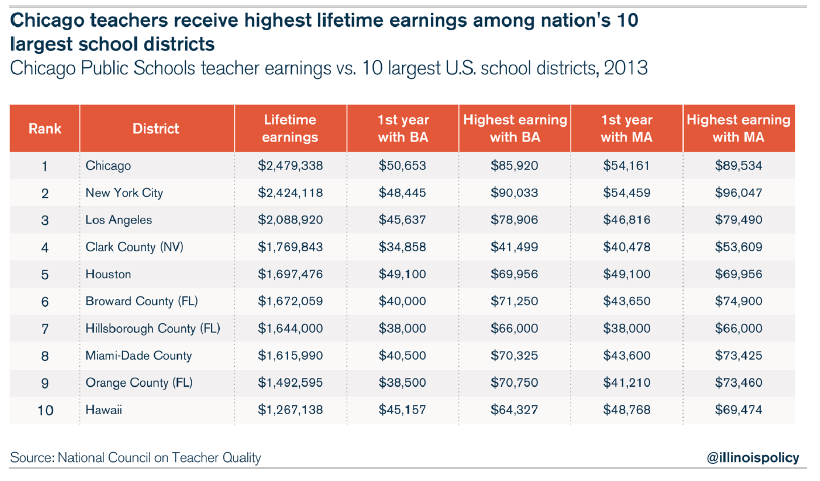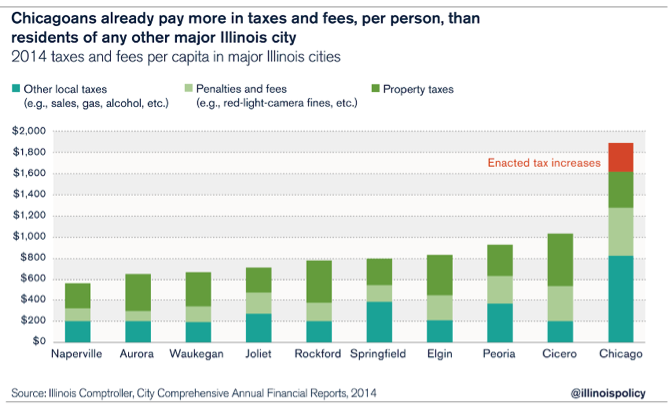6 reasons the Chicago Teachers Union has no business striking again
The Chicago Teachers Union should think twice before making demands that could result in more taxes on city residents, school closings and teacher layoffs.
Update: NBC 5 news reported Sunday night that the Chicago Teachers Union has set a strike vote for Dec. 9.
The Chicago Teacher’s Union, or CTU, is threatening to strike just three years after its most recent walkout, a move that shows a lack of regard for Chicago’s fiscal crisis and the growing burden taxpayers have to bear. The city and Chicago Public Schools, or CPS, are collectively facing deficits of over $1 billion, and Chicagoans are about to be hit by $700 million in additional annual taxes.
CPS and CTU are locked in negotiations over a new contract. Both sides have agreed to mediation in an effort to resolve their disputes and work out a new agreement.
But CTU has indicated more than once that it is willing to call a strike, though that’s unlikely to happen anytime soon, according to the rules governing contract negotiations in Chicago.
CTU last went on strike only three years ago. That strike kept students out of school for nearly a week, hit CPS with additional costs, resulted in layoffs for thousands of teachers and helped drive the district into near-insolvency.
Another strike by Chicago teachers would only make the situation worse for everyone – for the city and its budget, for taxpayers and even for Chicago teachers themselves.
Here are six reasons why the CTU has no business striking again:
1. Chicago teachers already receive the highest lifetime earnings of teachers in the 10 largest cities in the U.S.
When Chicago teachers went on strike in 2012 demanding higher wages, CTU members already received high salaries and generous pension benefits.
And according to a 2014 report from the National Council on Teacher Quality, Chicago teachers actually receive the highest lifetime earnings when compared to teachers in the 10 largest cities in the nation.
It would be a mistake for Chicago teachers to strike for even higher wages – especially when ordinary Chicagoans are facing a massive tax hike.
2. Chicagoans have just been burdened with a massive $700 million tax hike
Chicagoans already face the highest per-capita tax burden of any residents in Illinois’ major cities – by far.
And the majority of the new $700 million tax hike passed by City Council on Oct. 28 won’t go toward better schools or repaved roads, but to pay off the city’s police and firefighter pension debt.
City and CPS officials are walking a fine line with Chicago taxpayers. If serious fiscal reforms aren’t enacted, politicians and CPS officials could demand an additional tax hike to pay for CPS’ massive budget deficit and pension debt, which would drive still more taxpayers out of Chicago and Cook County.
3. The Chicago Teachers’ Pension Fund is $9.5 billion in debt – and growing
Since the CTU last went on strike, the Chicago Teachers’ Pension Fund’s shortfall has risen nearly 20 percent, to $9.5 billion in 2014.
The pension fund is already basically insolvent. It currently has only half the money it needs to pay out future benefits to teachers.
4. CPS pension payments have skyrocketed by $500 million
CPS’ required contributions to teachers’ pensions have skyrocketed by $500 million since the CTU’s last strike. As a result, the school system has been forced to borrow with short-term money to make its payments to the pension fund.
5. Pension benefits have grown 5 percent a year since 2000
Chicago teacher pension benefits have been growing at a rate of 5 percent a year since 2000, twice the rate of inflation and far faster than the growth in Chicagoans’ median household income.
That means pension benefits for teachers have been growing far faster than ordinary Chicagoans’ ability to pay for those benefits.
6. The 2012 strike resulted in 50 school closures and thousands of layoffs
Despite warnings from CPS about its fiscal condition, Chicago teachers went on strike in 2012, demanding – and then receiving – additional benefits at the expense of the district’s finances.
Shortly after the strike ended, CPS announced it would have to close 50 schools and proceeded to lay off thousands of teachers to help reduce costs.
With CPS in even worse financial shape today, a strike could result in even more laid-off teachers.
With CPS and its teachers’ pension fund in such poor financial shape, the massive new tax burden on taxpayers and the fact that teachers already receive generous benefits, CTU has no business striking again.
And instead of giving in to the CTU’s demands, CPS should focus on getting its fiscal house in order.






